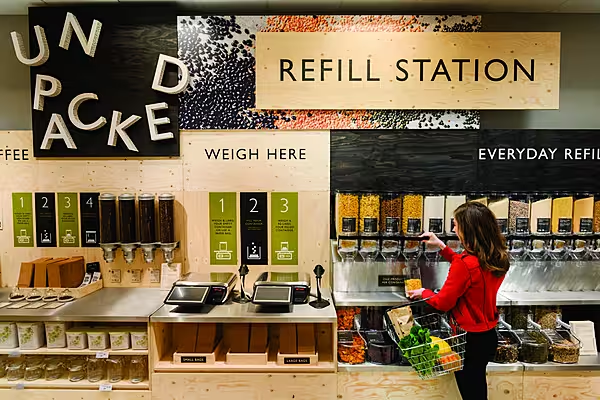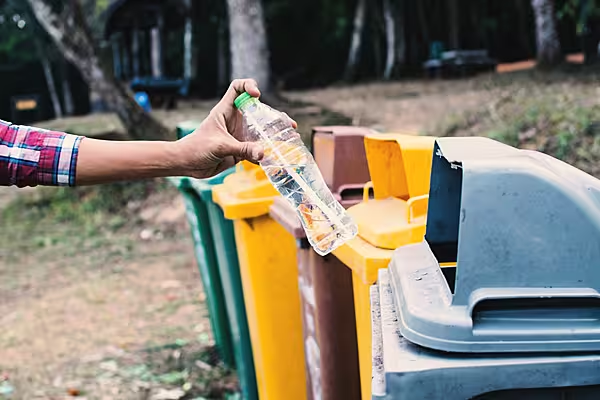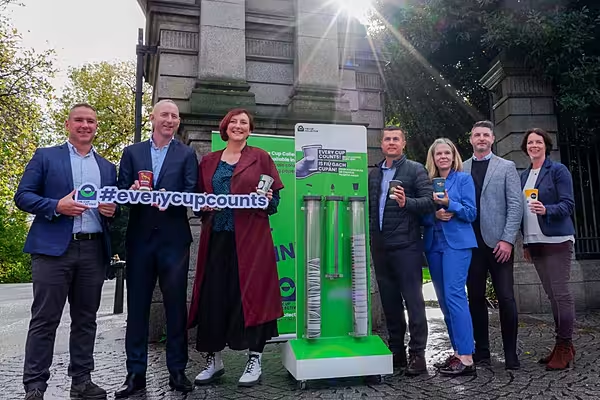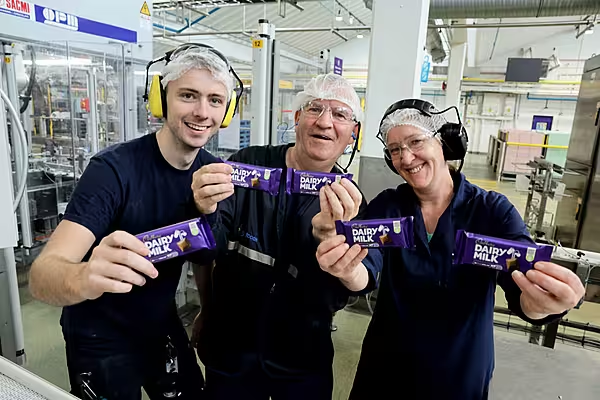Ocean plastic, and plastic in general, has captured the public imagination like nothing before, fuelled by a national and global media dominated by the subject of climate change. As 2019 marks and important milestone in Irish consumers’ environmental consciousness, Maev Martin looks at what this means for brands and retailers
It means, among other things, that demand among consumers for sustainable packaging has grown significantly and is likely to continue to grow over the coming years. Statistics reveal that only 30% of Europe’s plastic is recycled.
However, in March, MEPs voted in favour of a new EU directive banning single-use plastic, including cutlery, cups and plates, cotton buds, straws, drink-stirrers and balloon sticks, from 2021.
That’s why many retailers and FMCG companies have continued their quest this year to innovate beyond plastic packaging and embrace alternatives.
At least 80% of Irish consumers believe that to preserve the planet, we need to change how we consume and produce food.
A survey by European Milk Forum (EMF), published last month, revealed that, among Irish consumers, reducing food waste and the recycling of waste continue to top the list for climate-conscious actions by people.
It also that preserving natural resources, conscious consumption and production, and climate change, are associated most with sustainability.
The government’s climate action plan includes an ambition to halve the overall amount of food wasted in Ireland, reduce the use of plastics and plastic packaging, and increase the overall recyclable rate by 60%.
Speaking to reporters at the MacGill Summer School in Glenties, Co Donegal last month, Minister for the Environment, Richard Bruton said that he would look at the introduction of a ‘name and shame’ system for supermarkets that fail to reduce the amount of plastic packaging used on food products.
Mr Bruton said that this will be done with regulations, if necessary, and will involve extracting pledges from companies to reduce their carbon footprint. In addition, there will be higher waste management fees on those companies that create more non-recyclable rubbish.
However, it would appear that the Irish grocery retail trade has been anticipating ministerial intentions, as it continues to set targets and introduce practical measures to ensure as waste-free an experience as possible for consumers.
Ireland’s green grocers
Among other things, Irish grocery retailers have been staunch supporters of various Repak environmental initiatives.
Lidl, Aldi, Tesco and Musgrave Group were among 65 industry leaders who signed up to the Repak Plastic Pledge, which will see over 10,600 tonnes of plastic packaging diverted from waste by the end of this year.
The first progress report on this initiative was launched on 10 May. It revealed that retailers and FMCG companies are playing a key role in helping to deliver some of the commitments in the pledge, one of which is to support Ireland to deliver the Circular Economy Package plastic recycling targets of 50% of all plastics by 2025 and 55% of all plastic packaging by 2030, as set by the European Commission.
This was a big focus for the Musgrave Group during 2018, which resulted in the removal of 460 tonnes of non-detectable black plastic trays across 44 fruit and vegetable product lines.
A further 11 tonnes of soft plastics have been removed across produce ranges, while 15 organic product lines (SKUs) have moved from non-recyclable plastic to compostable packaging. At its distribution centres, Musgrave also operates a one-stop-shop for waste management which is designed to maximise the segregation of packaging for recycling.
Aldi, another signatory of Repak’s Plastic Pledge, has committed to ensuring that 100% of its own label packaging will be recyclable, reusable or compostable by 2022 and to achieving a 50% reduction in packaging across its own-label products by 2025. Another one of the Pledge’s commitments is to ensure that our approach to plastic packaging reduction is aligned to Ireland’s goal of a 50% reduction in food waste by 2030 as set out in Ireland’s food waste charter.
Through its partnership with Food Cloud, Aldi has donated over 1.5 million meals (almost 640 tonnes of surplus food) to charities across Ireland.
Lidl Ireland has published several ambitious plastic reduction targets, including using 20% less plastic packaging by 2022 and having 100% recyclable own-brand packaging by 2025.
Last year, Lidl Ireland discontinued the sale of single use plastic items in store, including plastic drinking straws, disposable plastic cups and glasses, plates and cutlery.
Lidl also introduced biodegradable packing solutions to its Fairtrade banana suppliers, removing all plastic. The solution was a first of its kind in Ireland. Lidl is also rolling out recycling bins in store to allow customers to leave unwanted packaging behind.
The retail giant has also removed microbeads from all cosmetic and household ranges and unrecyclable black plastics from numerous categories across its range.
This month, Lidl Ireland announced plans to launch reusable bags for fruit and vegetables its 162 outlets in Ireland in September. The 'Green Bags', priced at 99c a pair, will offer customers a sustainable alternative to single-use plastic bags for purchasing fruit and vegetables. "We are delighted to be the first Irish retailer to introduce reusable bags for loose fruit and veg for our customers,” said Deirdre Ryan, head of CSR at Lidl Ireland.
Tesco Ireland is working hard to reduce the use of plastics by minimising plastic packaging in Tesco own label products. In May of last year, Tesco pledged to ban hard-to-recycle plastics from all of its own brand products, including PVC, polystyrene, oxy degradable materials, polylactic acid, water soluble bio plastics and industrial compostable materials.
Speaking at the Checkout conference earlier this year, Tesco Ireland CEO Kari Daniels, said: “By 2025, there will be more plastic in the oceans than fish if we continue as we are. By 2025, all of Tesco’s paper and board, as well as food, will be sustainably sourced, and we will have halved packaging waste in our business. Tesco was the first national partner of Food Cloud, and we were the first retailer in Ireland to report our food waste data.”
A broader agenda
Of course, the sustainable retailing agenda is about more than plastic packaging reduction or eradication – it covers a wide range of areas such as healthy eating, sustainable store design and construction, the movement towards veganism and vegetarianism, the integrity of the supply chain, and food provenance.
“2018 saw the roll-out of dedicated vegetarian/vegan zones across SuperValu stores, the introduction of fully compostable and biodegradable bags, and the piloting of a living herb wall concept, giving shoppers the option to pick their own fresh produce from the plant, while reducing packaging and food waste,” said Musgrave Group CEO, Chris Martin, in an exclusive interview with Checkout on 10 May, the day that he announced his retirement from the group.
“Sustainability goes to the heart of the Musgrave brands – we are working on plastic reduction, plastic bag removal, and we have introduced compostable coffee cups for our Frank & Honest brand. However, sustainability isn’t just fundamental to the group, but to our local independent retailers, as they have to be good neighbours in the community.”
Lidl Ireland recently completed the installation of energy-saving solar panels at its Birr store, adding a further investment of €130,000 in renewable energy. The newly-installed solar panels, supplied by Cavan-based Kingspan, will produce 120,000-kilowatt hours of energy from a sustainable resource annually. This is the equivalent of the electricity requirements of 28 homes, and reduces the store’s carbon output by some 40 tonnes per year.
The investment in Birr is part of an ongoing €1 million commitment by Lidl to install solar panels at eight new and reconstructed stores.
In June, BWG Foods revealed that it has donated over 100 tonnes of food since partnering with FoodCloud in 2017, providing over 215,000 meals for people in need across Ireland.
“Minimising food waste is something that we in BWG Foods are very passionate about and organisations like FoodCloud are to be commended for providing solutions that allow businesses like ours to reduce our environmental impact, while also importantly giving back to the communities that we serve across Ireland,” said BWG Foods managing director, Willie O’Byrne.
What’s happening overseas?
Waitrose & Partners recently announced plans to introduce its packaging-free pilot project, Waitrose Unpacked, to three more stores in the UK.
In June of this year, the retailer launched a packaging-free trial in its Botley Road shop in Oxford as part of its efforts to minimise plastic packaging. It also extended the trial in Botley Road shop beyond its original end date of 18 August following an 'overwhelmingly positive response' by customers.
Commenting on the response, head of CSR for Waitrose & Partners, Tor Harris, said, "The reaction to Waitrose Unpacked has been incredible with the invaluable feedback from thousands of customers giving us the confidence that they are prepared to change how they shop with us."
Trials will commence in Waitrose outlets in Cheltenham in Gloucestershire in September, and Abingdon and Wallingford in Oxfordshire in November. All three shops will have a dedicated refillable zone with dispensers for dried products, frozen ‘pick and mix’, coffee, wine, and beer refills, as well as Ecover detergent and washing liquid refills. A wide range of unpacked fruit and vegetables will also be available.
Black plastic replaced
Sainbury's is replacing black plastic used in chilled ready meal trays with natural CPET, a form of recyclable plastic.
The new material will be incorporated in the packaging of all chilled ready meals by November of this year.
The move will enable the company to recycle its chilled ready meal trays across the UK. Sainsbury's recently removed plastic for loose fruit and vegetables in its Lincoln and Kidlington superstores, as part of a trial project to encourage customers to reduce, reuse, replace and recycle more plastic.
The trial, which finishes this month, allows customers to bring their own bags or purchase a reusable drawstring bag made from 100% recycled materials for 30p.
Sainsbury’s recently launched water refill stations in more than 300 stores across the UK and is also testing reverse vending machines in the UK and Scotland, which allow customers to return plastic bottles and aluminium cans for recycling.
Marks & Spencer recently introduced a 25p discount on 'to-go' meals purchased from Market Place counters for customers who bring reusable containers. The move will help the retailer to achieve its goal of making all its packaging widely recyclable by 2020.
Paul Willgoss, director of food technology at M&S, said, "Our Market Place containers are already widely recyclable, but we want to go a step further with the introduction of an incentive to encourage customers to switch to reusable containers."
Single-use containers offered by M&S in its Market Place counters, which operate in 23 M&S outlets in busy, central locations such as London Pantheon on Oxford Street, Newcastle, Norwich and Manchester, are made of FSC-certified cardboard and come with a plastic lid.
UK retailer Asda has been offering single-use plastic carrier bags with its online grocery orders since 31 July. The retailer removed the option of ‘bagged’ delivery on all online grocery orders and click-and-collect orders across the UK.
Asda says that it will remove 85 million plastic bags from its operations annually through this initiative. In addition, this month the retailer announced that it had resurfaced its car park in Wakefield with non-recyclable plastic from discarded water bottles, making Asda the first retailer in the UK to try this innovative concept.
Lidl announced on 1 August that it had introduced reusable net bags for fruit and vegetables in all its 119 outlets across Denmark. The initiative is expected to reduce the consumption of single-use fruit and vegetables bags by around 20%.
The new bags, priced at DKK 5 a pair, can be washed in washing machines. Lidl has pledged to donate a part of the proceeds from the sales of these bags to its strategic partner, Plastic Change. The move makes Lidl the first retailer in Denmark to offer a reusable alternative to disposable plastic bags used in the sale of loose fruit and vegetables.
Bring your own box
In 2018, Spar Austria trialled packing cold cuts, cheese and meat at the service counters into boxes brought to the store by customers.
As that trial proved to be successful and was accepted by customers, the initiative will now be rolled out to all Spar, Eurospar and Interspar stores throughout the country. Customers who want to use as little packaging as possible when shopping can now bring their own boxes to all Spar Austria’s stores.
Special trays ensure that stringent hygiene laws are adhered to and that the boxes brought in by customers do not come into contact with the counter, scales or cutlery.
However, it hasn’t been entirely plain sailing for retailers trying to create a plastic-free and, ultimately, more sustainable retail environment. Iceland has promised to eliminate plastic entirely from its own-brand products by 2023, but the group was forced back to the drawing board on two key trials this year.
The eco-friendly supermarket had to reintroduce plastic packaging across its bananas this summer, equating to 10 million plastic bags a year, after its paper band replacement failed to live up to hopes. In May, Iceland also scrapped a plastic-free greengrocer trial that was running in Liverpool after just three months, following a 20% plunge in sales.
However, despite these difficulties, Iceland remains undaunted and launched a plastic-free banana packaging trial across 20 stores on 24 July.
The retailer is also planning a new plastic-free greengrocer initiative that will run across more than 30 stores later this year, which will be focused on pre-packed produce rather than loose items, in response to customer feedback from the failed trial.
© 2019 Checkout – your source for the latest Irish retail news. Article by Maev Martin. Click sign-up to subscribe to Checkout.









